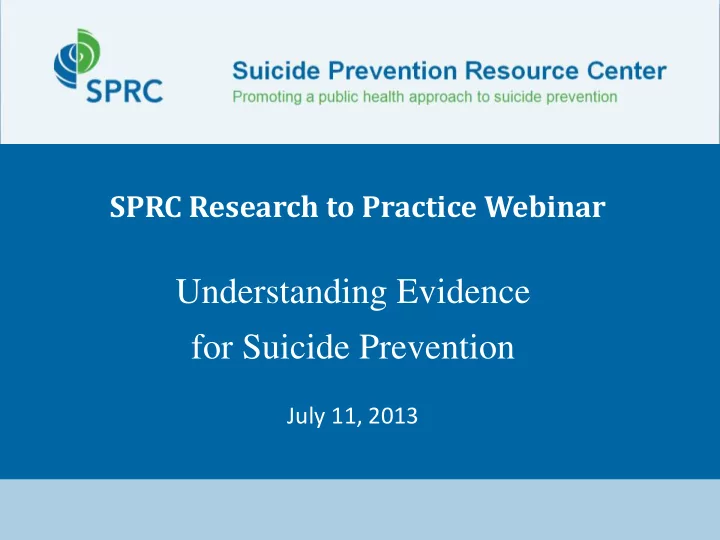

SPRC Research to Practice Webinar Understanding Evidence for Suicide Prevention July 11, 2013
SPRC Research to Practice Presenters Philip Rodgers, PhD Evaluation Scientist, American Foundation for Suicide Prevention Sally Thigpen, MPA Health Scientist, National Center for Injury Prevention and Control Centers for Disease Control and Prevention Natalie Wilkins, PhD Behavioral Scientist, National Center for Injury Prevention and Control Centers for Disease Control and Prevention Angelita Lee Research Assistant/Case Manager, White Mountain Apache, Johns Hopkins Center for American Indian Health
Opening Remarks Philip Rodgers, PhD Evaluation Scientist American Foundation for Suicide Prevention
Understanding Evidence for Suicide Prevention A Demonstration of CDC’s Interactive Tool to Support Evidence-Based Decision Making Natalie Wilkins, PhD Sally Thigpen, MPA Helen Singer, MPH Richard Puddy, PhD MPH Division of Violence Prevention National Center for Injury Prevention and Control Centers for Disease Control and Prevention
What is ‘Evidence?’ “Evidence can be defined as information “The available body of facts or or facts that are systematically obtained, information indicating whether a belief or proposition is true” ( New Oxford i.e. obtained in a manner that is replicable, observable, credible, verifiable, or American Dictionary,2001) basically supportable.” (Rycroft-Malone & Stetler, 2004) “Evidence comprises the interpretation of “For public health professional evidence empirical data derived from formal research or is some form of data - including systematic investigations using science or social epidemiologic (quantitative) data, results science methods.” ( Rychetnik et al, 2002) of program or policy evaluations, and “Evidence concerns facts (actual or qualitative data - for use in making asserted) intended for use in support of judgments or decisions,” (Brownson, a conclusion .” (Canadian Health Fielding, and Maylahn, 2009) Services Research Foundation, 2004)
Framework for Thinking About Evidence Best Available Research Evidence Evidence Based Decision Making Contextual Experiential Evidence Evidence
Framework for Thinking About Evidence Best Available Research Evidence Evidence Based Decision Making Contextual Experiential Evidence Evidence
Framework for Thinking About Evidence Best Available Research Evidence Evidence Based Decision Making Contextual Experiential Evidence Evidence
Measurable Contextual Variables Across the Social Ecology Societal Community Relationship Individual Community Values Employment Family Health Laws and Policies Opportunities History Income Physical Social Norms and Social Capital Infrastructure Age, Gender, Cultural Identity Values Peer Support Individual Values Media Community History Family Values
Framework for Thinking About Evidence Best Available Research Evidence Evidence Based Decision Making Contextual Experiential Evidence Evidence
What is Experiential Evidence? • The collective experience and expertise of those who have practiced or lived in a particular setting. • The knowledge and expertise of subject matter experts.
Putting it all Together: Evidence-Based Decision Making Key Characteristics • Transparency • Inclusiveness/Participation • Openness/Explicitness • Skilled Leadership • Defined Process
CDC’s Framework for Program Evaluation
Understanding Evidence http://vetoviolence.cdc.gov/evidence
Thank you! Natalie Wilkins nwilkins@cdc.gov Sally Thigpen sthigpen@cdc.gov Helen Singer hhsinger@cdc.gov Rich Puddy rpuddy@cdc.gov
Practitioner Perspective Practitioner Perspective Angelita Lee White Mountain Apache
Co Contac act t Us Edna Pressler, PhD Director SPRC Training Institute epressler@edc.org 617-618-2979 Dominique Lieu, MA Training Coordinator SPRC Training Institute dlieu@edc.org 617-618-2984 www.sprc.org
Recommend
More recommend